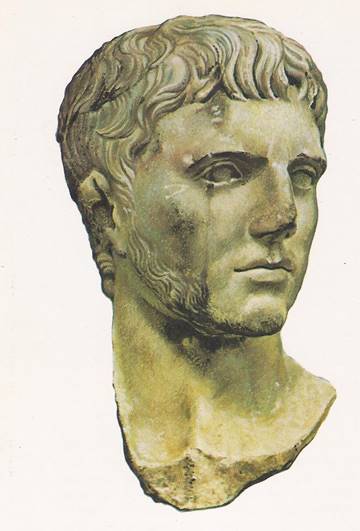ROME was no longer just a city — it was a world. In the reign of Hadrian, the blaring trumpets that announced the comings and goings of the emperor echoed in Spain, Syria and Britain as often as in Italy. Hadrian wanted to know what was going on in all of his empire. He wanted to inspect the troops and forts that held the frontiers and to judge for himself the wisdom of the governors he had sent to rule the provinces. He wanted to visit the towns and cities, to see their ancient buildings, to plan new buildings where …
Read More »Tag Archives: Alexandria
The Second Triumvirate 43 B. C. – 30 B. C.
AS THE news of Caesar’s death spread through Rome, sorrow, anger and fear took hold of the city. On March 17, two days after the murder, the Senate met again. Cassius, Brutus and the other assassins took their usual places. There was no doubt that most of their fellow senators felt that they had done the right thing in ridding Rome of a tyrant, but Caesar’ s veterans were still in the city, taking their orders now from Marcus Aemilius Lepidus, who had been his Master of the Horse, the commander of the cavalry. Mark Antony was still consul, he …
Read More »The City of Caesar 80 B. C. – 44 B. C.
THE story of Rome in the years after Sulla’s death was the story of a partnership of power. It was the tale of three men who bargained for the world — a rich man, a poor man and a man who was not only a hero, but looked it. The rich man was Crassus, who had become a millionaire by setting up the only fire department in Rome. The tall buildings and narrow, crowded streets of the city made a fire a constant danger. When one house burned to the ground, the buildings on either side were likely to fall …
Read More »Greece and the World 323 B. C. – 250 B. C.
In the last years of the fourth century B. C., Greek citizens going about their business in the stoas or the shops sometimes stopped and wondered what was wrong. Everything seems strange. They themselves had not changed and their cities looked the same as before, but the world around them was so different that they could hardly recognize themselves. The little poleis on the mainland looked out at an enormous empire, which stretched across Asia and Egypt. They shipped their olive oil and pottery across the Mediterranean. Their corn came from fields beside the Black Sea and the Nile. Merchants …
Read More »


